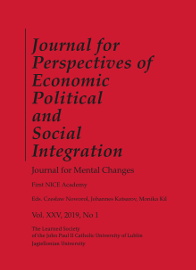Developing a Moral Sensitivity Measure for Career Guidance and Counselling
Abstract
Moral sensitivity, the ability to recognize ethical issues when they arise in practice, is a key premise for career practitioners’ professional conduct of Career Guidance Counselling (CGC). Due to the diversity of ethical issues related to CGC and the situational contingency of ethical problems, the assessment of moral sensitivity is challenging. The purpose of this article is to develop a novel measure of moral sensitivity, consisting of triad judgment tasks, to assess whether career practitioners are capable of identifying ten ethical issues related to the CGC practice. In this article, we present our theoretical approach, the development phases of the Guidance Ethical Sensitivity Test (GUEST) and the first administration of the GUEST. The reliability was assessed by performing Polychoric Correlations and Categorical Principal Components Analysis (CATCPA). Administrations showed that ethics experts and most groups with ethics training scored significantly higher than others without ethics training. Future GUEST validations and implications for CGC research, training and policy are discussed.
References
Bazerman, M., & Tenbrunsel, A. (2011). Blind spots: Why we fail to do what’s right and what to do about it. Princeton: Princeton University Press.
BeQu (2014). Professionell beraten: Qualitätsstandards für die Beratung in Bildung, Beruf und Beschäftigung. Berlin: W. Bertelsmann.
CDP (2012). Code de déontologie des psychologues [French Code of Ethics for Psychologists], http://www.codededeontologiedespsychologues.fr/LE-CODE.html (15.2.2018)
Chan, S., & Leung, F. (2006). The effects of accounting students’ ethical reasoning and personal factors on their ethical sensitivity. Managerial Auditing Journal, 21(4), 436-57, DOI:10.1108/02686900610661432.
DGfB (2003). Beratungsverständnis. Köln: Deutsche Gesellschaft für Beratung e.V. http://dachverband-beratung.de/dokumente/DGfB_Beratungsverstaendnis.pdf (15.2.2018)
DGfK (2007). DGfK Standards und ethische Grundsätze. Deutsche Gesellschaft für Karriereberatung e.V. http://www.dgfk.org/ethische-grundlagen.html (15.2.2018)
dvb (2016). Professionelle Bildungs- und Berufsberatung [Professional Career Guidance]. Deutscher Verband für Bildungs- und Berufsberatung e.V. http://www.dvb-fachverband.de/fileadmin/medien/grundsatzpapiere_dvb/2016_04_23_Grundlagenpapier.pdf (15.2.2018)
Fialkov, E. D., Jackson, M. A., & Rabinowitz, M. (2014). Effects of Experience and Surface-Level Distraction on Ability to Perceive Ethical Issues. Training and Education in Professional Psychology, 8(4), 277-284, http://dx.doi.org/10.1037/tep0000067.
Heinz, S. (2017). Faktorenanalyse mit binären Items in SPSS. Blog post from August 28, 2017. https://www.statworx.com/at/blog/faktorenanalyse-mit-binaeren-items-in-spss/ (22.03.2019)
IAEVG (2017). IAEVG Ethical Guidelines. Mexico City: International Association for Education and Vocational Guidance. http://iaevg.net/wp-content/uploads/IAEVG-EthicsNAFeb2018Final.pdf (13.8.2018)
IBM (61077). Exploratory Factor Analysis with categorical variables. IBM Support no. 61077. https://www-01.ibm.com/support/docview.wss?uid=swg21477550 (22.03.2019)
Jordan, J. (2007). Taking the First Step Toward a Moral Action: A Review of Moral Sensitivity Measurement Across Domains. The Journal of Genetic Psychology, 168(3), 323-359. http://dx.doi.org/10.3200/GNTP.168.3.323-360
Jordan, J. (2009). A social cognition framework for examining moral awareness in managers and academics. Journal of Business Ethics, 84, 237–258. DOI: 10.1007/s10551-008-9706-3
Katsarov, J. (2018, February). Internationale und nationale Ethikstandards für die Beratung – Was wollen wir damit? Kick-off speech (Forum 2) at the conference “Ethik in der Beratung” at the University of Applied Labor Studies in Mannheim. Retrieved 29.03.2019) from https://www.dvb-fachverband.de/fileadmin/user_upload/Katsarov_2018_Ethik_in_der_Beratung_korr.pdf
Katsarov, J., & Christen, M. (2018). Promoting the Moral Sensitivity of Policy and Military Personnel. NECESSE, 3(1), 114-120.
Lindsey, R. T. (1986). Differences in Moral Sensitivity Based on Varying Levels of Counseling Training and Experience (Unpublished doctoral dissertation). Denver: University of Denver.
Medeiros, K., Watts, L., Mulhearn, T., Steele, L., Mumford, M., & Connelly, S. (2017). What is Working, What is Not, and What We Need to Know: a Meta-Analytic Review of Business Ethics Instruction. Journal of Academic Ethics 15: 245-275, DOI: 10.1007/s10805-017-9281-2.
Narvaez, D. (2006). Integrative Ethical Education. In M. Killen & J. Smetana (Eds.), Handbook of Moral Development (pp. 703-733). Mahwah, NJ: Erlbaum.
NCDA (2015). Code of Ethics. Broken Arrow, OK: National Career Development Association. https://www.ncda.org/aws/NCDA/asset_manager/get_file/3395 (15.2.2018)
NICE (2012). NICE Handbook for the Academic Training of Career Professionals (edited by C. Schiersmann, B.-J. Ertelt, J. Katsarov, R. Mulvey, H. Reid, & P. Weber). Heidelberg: Heidelberg University.
NICE (2016). European Competence Standards for the Academic Training of Career Practitioners. NICE Handbook Volume II (edited by C. Schiersmann, S. Einarsdóttir, J. Katsarov, J. Lerkkanen, J. Pouyaud, K. Pukelis, R. Mulvey, & P. Weber). Opladen: Barbara Budrich.
Rabinowitz, M., & Hogan, T. (2008). Experience and problem representation in statistics. The American Journal of Psychology, 121, 395-407, DOI:10.2307/20445474.
Rest, J. (1982). A Psychologist Looks at the Teaching of Ethics. The Hastings Center Report, 12(1), 29-36.
Reynolds, S. J. (2006). Moral awareness and ethical predispositions: Investigating the role of individual differences in the recognition of moral issues. Journal of Applied Psychology, 91, 233–243, DOI: 10.1037/0021-9010.91.1.233.
S&G (2004). Code of Ethics. The Canadian Standards & Guidelines for Career Development Practitioners. http://career-dev-guidelines.org/career_dev/index.php/the-standards-guidelines/code-of-ethics (15.2.2018)
Sirin, S. R., Brabeck, M. M., Satiani, A., & Rogers-Serin, L. (2003). Validation of a measure of moral sensitivity and examination of the effects of previous multicultural and ethics courses on moral sensitivity. Ethics & Behavior, 13(3), 221-235.
Sternberg, R. (1998). Abilities are forms of developing expertise. Educational Researcher, 27(3), 11-20.
Tanner, C., & Christen, M. (2014). Moral intelligence – A Framework for Understanding Moral Competences. In M. Christen, J. Fischer, M. Huppenbauer, C. Tanner, & C. van Schaik (Eds.), Empirically Informed Ethics (pp. 119-136), Berlin: Springer.
Volker, J. M. (1984). Counseling experience, moral judgment, awareness of consequences and moral sensitivity in counseling practice. Dissertation Abstracts International, 45(3-A), 793–794. (UMI No. 19850301)
You, D., Maeda, Y., & Bebeau, M. J. (2011). Gender Differences in Moral Sensitivity: A Meta-Analysis. Ethics & Behavior, 21, 263-282, DOI: 10.1080/10508422.2011.585591.
Weber, P., & Katsarov, J. (2012). Benefits of Professionalizing Career Guidance and Counselling. In NICE, NICE Handbook for the Academic Training of Career Guidance and Counselling Professionals (pp. 15-26), Heidelberg: Heidelberg University.

